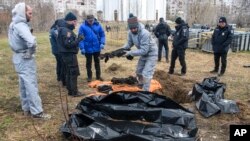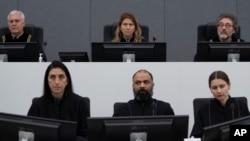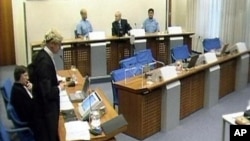In December, Ukraine President Volodymyr Zelenskyy summoned his ambassadors from around the world to discuss his foreign policy priorities for the new year.
Meeting in Kyiv, Zelenskyy gave the assembled diplomats “tasks and assignments” for the coming year, recalled Ukraine Ambassador-at-Large Anton Korynevych.
One of his main priorities for Ukrainian diplomacy, Zelenskyy told the group, was the creation of “an ad hoc special tribunal for the crime of aggression against Ukraine,” according to Korynevych, who is Ukraine’s point person on the issue.
This was not the first time Zelenskyy was demanding accountability for Russia’s aggressive war, without which, Ukrainian officials say, other crimes such as the atrocities in Bucha and Irpin would not have happened.
Going back to Russia’s invasion of Ukraine, in 2014, Kyiv has turned to every available international court to push legal claims against Moscow; the International Court of Justice, the European Court of Human Rights, the International Tribunal for the Law of the Sea.
“We’re in all the courts, but we see that these mechanisms and tools are not enough,” Korynevych said during a recent panel discussion at the New York City Bar Association. “There is no international court or tribunal which can try … Russian political and military leadership for the commission of the crime of aggression against Ukraine.”
Considered a “leadership crime,” the crime of aggression is defined as the “planning, preparation, initiation or execution” of an act of aggression such as an armed invasion by a country’s top political and military leadership. In the case of the Ukraine conflict, as many as 20 officials could be implicated, according to Korynevych.
In contrast to the painstakingly difficult-to-prove war crimes and crimes against humanity, proving the crime of aggression is relatively straight-forward. The evidence, according to the State Department’s top war crimes adviser, can be seen “on our front pages every day.”
Prosecuting the crime of aggression
To show what a case against Russia would look like, the Open Society Justice Initiative has drafted a 65-page “model indictment” that names Russian President Vladimir Putin and seven subordinates. Others have suggested including Belarusian officials since Belarus has allowed Russian forces to stage attacks on Ukraine from its soil.
The International Criminal Court (ICC), created in 2002 to deal with crimes of war, has the power to prosecute the crime of aggression but it can’t investigate Russian officials for aggression because of a legal quirk: Russia is not a "state party" to the Rome Statute that established the court. While the United States played a central role in the establishment of the Rome Statute that created the ICC, the U.S. isn’t a "state party" either.
Ukrainian courts face a legal hurdle of their own.
While the Ukrainian prosecutor general’s office has been investigating senior Russian officials for their alleged complicity in the crime, prosecutors can’t bring charges in the case because under international law top Russian officials enjoy immunity in Ukrainian courts.
Hence, Ukraine’s call for a special court to prosecute the crime.
A special international tribunal is the “most feasible and efficient route for accountability,” Prosecutor General Andriy Kostin said during a recent event at Georgetown Law Center. The center works closely with Kostin’s office.
Ukraine’s push for a special tribunal, like its plea for tanks and fighter jets, was once seen as a long shot.
But as Western nations amp up efforts to beat back the Russian invasion, Ukraine’s advocacy of “no peace without justice” is finding increasingly receptive ears among its international backers.
In recent months, the proposal for a special tribunal has been endorsed by the European Parliament, the Council of Europe, the Organization of Security and Cooperation in Europe, NATO, as well as several foreign governments such as Britain and Germany.
As a precursor to the tribunal, the European Commission this month announced plans to launch a prosecutor’s office in The Hague to investigate the crime of aggression and identify potential defendants.
All that has imbued Ukrainian officials with renewed optimism that their once seemingly elusive goal may be closer at hand.
“Now is the momentum for the international community to hold Russian aggressors accountable for the most flagrant act committed on European soil since 1945,” Kostin said.
Court models for a possible war tribunal
The last time the crime of aggression was prosecuted was in the 1940s when German and Japanese leaders were tried in Nuremberg and Tokyo for what the International Military Tribunal called the “supreme international crime.”
Western officials say the quest for Russian accountability is not just about Ukraine. At stake is the future of a rules-based international order that has largely held since the Second World War.
“No one in the 21st century," German Foreign Minister Annalena Baerbock said in The Hague last month, "must be allowed to wage a war of aggression and go unpunished.”
Yet even as Germany and other Western nations have thrown their weight behind a tribunal, they remain split over the form it should take.
In recent discussions among Ukrainian and Western officials, two competing models have emerged, according to experts involved in the discussions.
A so-called “hybrid” model, proposed by Germany, envisions "a court that derives its jurisdiction from Ukrainian criminal law."
To ensure its legitimacy, Baerbock said, the court would be located outside Ukraine, and include international prosecutors and judges. Rather than weaken it, it would strengthen the ICC, she said.
Another hybrid model, backed by the U.K. envisages a court “integrated into Ukraine’s national justice system with international elements." It's unclear where this court would be based.
Competing with the composite model is a proposal for a “fully international” tribunal established through negotiations between Ukraine and the United Nations and recommended by the U.N. General Assembly.
Modeled on U.N.-backed tribunals for Sierra Leone and Cambodia, the proposed court is being backed by a group of prominent international law experts and veterans of other international tribunals who say a hybrid structure would likely “immunize” Russian leaders and potentially run afoul of the Ukrainian Constitution.
"You need an international tribunal if you're going to go at the highest level," said Jennifer Trahan, a law professor at New York University and convener of the Global Institute for the Prevention of Aggression.
To get it up and running, Ukraine would make a formal request to the United Nations. Once the U.N. General Assembly makes a recommendation, the United Nations and Ukraine would engage in talks to create the tribunal through a mutual treaty.
Trahan said the model has the support of “a handful of countries,” with “more support growing.”
The U.S., which is part of a “core group” of more than 20 countries studying proposals for a tribunal, hasn’t taken a public stand.
Nor has Ukraine made a formal request to the United Nations. Although Kyiv hasn’t ruled out other options, Korynevych voiced support for involving the United Nations in the process.
Saying U.N. support is critical for the legitimacy of any tribunal, Korynevych added, “That is why we’ll use the possibilities of the United Nations, in particular the General Assembly, in order to sound this issue, and in order to get the support of the United Nations in relation to this endeavor.”
The proposed tribunal has been met with some skepticism. For one, ICC chief prosecutor Karim Khan has pushed back against the notion, warning about the potential for “fragmentation.”
An ICC spokesperson said the ICC as a court has “never made any statement about potential ad hoc tribunals.”
Other critics have raised concern that establishing a special tribunal could undercut efforts to end the Ukrainian conflict by making Russian leaders less amenable to peace.
“Someone who is fighting a war is less likely to prosecute a peace or to engage in peace talks if he thinks, ‘Hmmm, if there is peace, we’re going to The Hague,’” Senator Rand Paul, a frequent critic of U.S. foreign policy, said during a recent Senate hearing.
Responding to Paul, Undersecretary of State Victoria Nuland said both goals — peace and justice — could be pursued simultaneously.
“I’d cite the precedent of Kosovo, of Bosnia, of Rwanda where we’ve successfully supported wars winding down through diplomatic means while also pursuing justice,” Nuland said.
Russia, which has sought to justify the invasion of Ukraine by accusing Ukraine of carrying out “genocide” in eastern Ukraine, has questioned the proposed tribunal’s legitimacy.
Ultimately, even if a fully international tribunal is created, it’s unclear if it would be able to conduct much of a trial while Putin holds power.
To other would-be aggressors, critics say, that failure would convey the message that they can commit aggression and get away with it.
But that’s not a reason not to pursue a mechanism for accountability, Trahan said, noting that the U.N. Security Council created an ad hoc tribunal for the former Yugoslavia not knowing that Serbian leader Slobodan Milosevic would ever end up in The Hague.
But he did. In 2001, a new Serbian government arrested and handed Milosevic over to the Tribunal.
Though he died five years later before his trial was to conclude, the court eventually convicted a number of his co-conspirators, giving his victims a measure of justice.
“Never say never,” she said.










